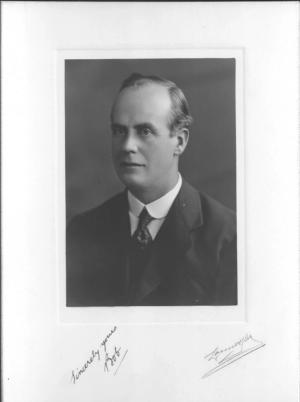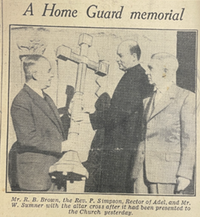
Brothers at War: Robert Broughton Brown
Robert was the eldest child of Richard Harper Brown and Annie Brown (née Crossley) born in Hebden Bridge on March 6th, 1882. He was the eldest of seven siblings and the recipient of many letters written by his brothers Fred, Frank and Tom who fought bravely in World War I in different sectors of the British Army. Prior to and during the First World War, Robert was a businessman who ran the family business of clothing manufacturing, R. B. Brown & Sons. The business was founded by his grandfather, also named Robert Broughton Brown, and during his time in this role, he became a Freemason.
During the First World War while his brothers were at war, Robert remained home to run the family business. R. B. Brown & Sons had a contract with the British government to manufacture uniforms. This meant that Robert was exempted from the war as his role was essential. He also tried to get the same exemption for his younger brother, Fred. At first, this was somewhat successful as Fred was assigned to the army reserves however, this did not last as Fred was then sent into the Infantry division and then reassigned to the Labour Corps.

South Pennine Archives, LHC BRO 26 S
Robert held a Freemason membership from 1907. Freemasonry is an ambiguous topic. Throughout history the Freemasons have evolved from being defined as religion-adjacent rooted in secrecy to more modernly known for being a networking organisation for businessmen while still retaining some mystery. It is a secret society that only accepts male members with origins tracing back to the 14th century with stonemasons’ guilds. During the 17th and 18th century, Freemasons began to mimic religious orders with a heavy focus on brotherhood. A common theme of freemasonry is the belief in the existence of a Supreme Being which all members must adhere to. The teachings of freemasonry include morality, charity and obedience to the law; however, historically freemasonry has received backlash from religious organisations and some sectors have been known to have racial and religious prejudices. However, based on the Freemason registry, it can be assumed that Robert used the organisation as a networking tool as many others did.
Robert's role at home involved primarily making sure that his brothers at war had what would be considered luxuries such as tobacco and fresh clothes. Fred wrote:
The baccy (tobacco) arrived all serene, thanks for same, it's good stuff.
He also acted as a point of call for all the brothers as shown when Frank asked:
Can you find anyone willing to have him brought home?
This also alludes to Robert's connections forged due to his Freemason membership.
After the war, Robert continued to run the family business in Hebden Bridge and Leeds and maintained his Freemason membership. He continued to keep in frequent contact with his brothers. His descendants donated this rich source of material to the South Pennine Archives, which has allowed us to learn about their experiences. The story of these four brothers, outlined in more detail in the coming weeks, gives a full picture of the experience of men during the First World War from fighting on the Western Front to being an essential worker on the home front.